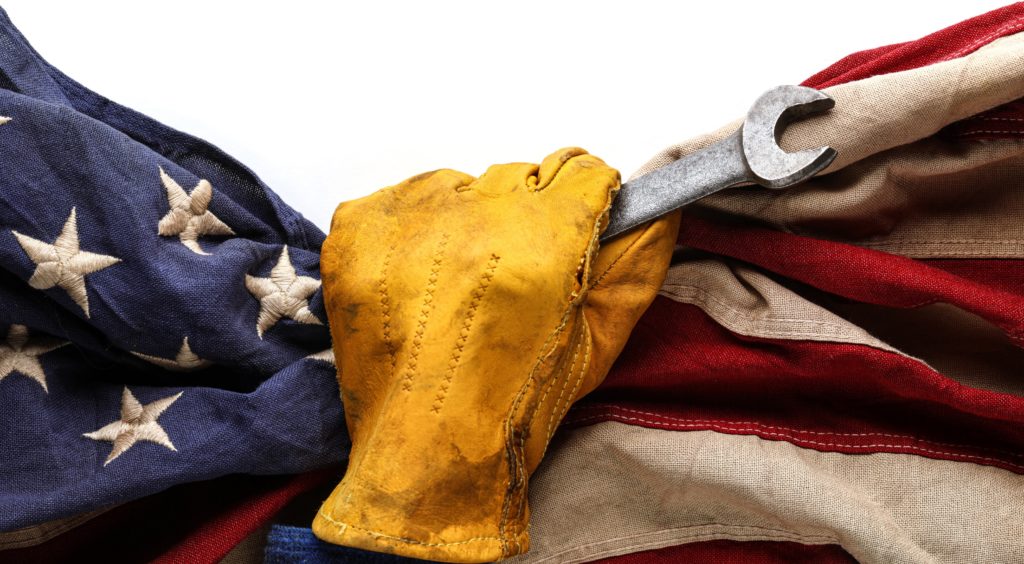In the intricate world of sheet metal manufacturing, understanding the nuances of governmental procurement regulations is paramount. One such set of regulations that holds significant sway over the industry is the Buy American Act and Buy America requirements. These regulations, though distinct, share a common goal: to bolster domestic manufacturing and support American industries.
Today, we’ll be exploring the numerous intricacies of the Buy American Act and Buy America requirements. By navigating these regulations effectively, manufacturers can ensure compliance, seize opportunities, and strategically position themselves in the competitive landscape of government procurement.

I. Why Understanding Buy American Act and Buy America Requirements Matters for Sheet Metal Manufacturers
To this day, sheet metal manufacturing remains essential for many industries, including construction, transportation, and infrastructure development. Whether it’s supplying components for public transit systems, constructing bridges and highways, or fabricating parts for aviation projects, sheet metal manufacturers play a vital role in shaping the nation’s infrastructure.
Government agencies at the federal, state, and municipal levels are significant consumers of sheet metal products for various projects. As such, manufacturers must grasp the intricacies of procurement regulations governing these transactions. The Buy American Act and Buy America requirements set forth stringent guidelines dictating the sourcing and production of materials used in government-funded projects, including those involving sheet metal.
II. Buy American Act Essentials for Sheet Metal Manufacturing
The Buy American Act, enacted in 1933, is a foundational element of U.S. federal procurement regulations, significantly affecting sheet metal manufacturers that supply goods to government agencies.
- Applicability to Federal Government Purchases: The Buy American requirements apply to direct purchases by U.S. federal government agencies exceeding $10,000.
- Definition of “Produced in the U.S.”: Under the Buy American Act, goods must be manufactured in the U.S., with at least 50% of the cost of their components sourced domestically.
- Exceptions and Waivers: While the Buy American Act establishes stringent requirements, exceptions and waivers provide avenues for flexibility.

III. Buy America Requirements: Implications for Sheet Metal Manufacturing
In addition to the Buy American Act, sheet metal manufacturers must navigate Buy America requirements, which apply specifically to infrastructure projects receiving federal funding.
- Understanding Buy America Requirements: Buy America requirements mandate that iron, steel, and other manufactured products incorporated into infrastructure projects must be sourced from domestic sources. This stipulation aims to promote the use of American-made materials in projects funded by certain U.S. federal departments and agencies.
- Applicable Departments and Agencies: Various federal entities, including the U.S. Environmental Protection Agency (EPA), Federal Transit Administration (FTA), Federal Highway Administration (FHWA), Federal Railroad Administration (FRA), Amtrak, and Federal Aviation Administration (FAA), enforce Buy America requirements for projects falling under their purview.
- Sector-Specific Information: Buy America requirements vary across sectors, with distinct thresholds, impacted goods, and compliance criteria. For instance, transit projects overseen by the FTA may require that a certain percentage of rolling stock components be made in the U.S., while FHWA-funded highway projects may necessitate that iron and steel products be entirely sourced domestically.
- Challenges and Opportunities: Compliance with Buy America requirements presents both challenges and opportunities for sheet metal manufacturers. While ensuring adherence to domestic sourcing criteria may pose logistical and cost-related challenges, compliance opens doors to lucrative government contracts and reinforces the industry’s commitment to supporting American manufacturing.
IV. Sector-Specific Information for Sheet Metal Manufacturers
As highlighted in an article published by The Canadian Trade Commissioner Service (TCS), the following table summarizes the most important Buy America requirements:
| N/A | Contract value threshold at or above which the requirements apply | Impacted goods | Requirements |
| Federal Transit Administration (FTA) – Buses, subways and other mass transit projects | US$150,000 | Iron, steel and other components of rolling stock (defined in 49 CFR Part 661.3 as transit vehicles such as buses, vans, cars, railcars, locomotives, trolley cars and buses, and ferry boats) Non-rolling stock | 70% made in the U.S. Final assembly must also take place in the U.S. 100% made in the U.S. |
| Federal Highway Administration (FHWA) – Highways | US$2,500 or 0.1% of the contract value, whichever is higher | Iron, steel and manufactured goods made predominantly of steel and iron Does not apply to raw materials such as iron ore, pig iron, scrap steel and limestone. | 100% made in the U.S. |
| Federal Railroad Administration (FRA) – Trains | US$100,000 | Iron, steel and manufactured goods | 100% made in the U.S. |
| Amtrak – National Railroad Passenger Corporation | US$1 million | All manufactured and unmanufactured goods | 50% made in the U.S. Final assembly must also take place in the U.S. |
| Federal Aviation Administration (FAA) – Airport construction | No threshold | Steel and manufactured goods | 60% made in the U.S. Final assembly must also take place in the U.S. |
| Environmental Protection Agency | No threshold | Manufactured goods made with iron and steel funded by the following EPA programs: Clean Water State Revolving Fund; Drinking Water State Revolving Fund; Water Resources Reform and Development Act (PDF format); and Water Infrastructure Finance and Innovation Act | 100% of the total cost of iron and steel products must come from U.S. components |
V. Exceptions, Waivers, and State-Level Considerations
Sheet metal manufacturers must navigate various exceptions, waivers, and state-level considerations to ensure compliance with Buy America requirements.
Exceptions and Waivers
- Despite stringent Buy America requirements, exceptions and waivers provide flexibility in certain circumstances.
- Exceptions may be granted for public interest or if the cost of U.S. products is deemed unreasonable compared to foreign alternatives.
- Waivers may also be issued if products are unavailable in sufficient quantities or satisfactory quality domestically.
- For more information, please see the TCA’s Exceptions and Waivers.
State-Level Buy American-Like Requirements
- Many U.S. states have their own Buy American-like provisions in procurement legislation, imposing additional requirements on manufacturers.
- Sheet metal manufacturers operating in multiple states must familiarize themselves with these state-specific regulations to ensure compliance.
- State-level requirements may vary, presenting logistical challenges for manufacturers seeking to meet diverse procurement standards.
Set Asides for Small Businesses
- The U.S. federal government mandates set asides for procurements below $250,000, reserved for small businesses.
- While Canadian firms are not eligible to bid directly on set-aside contracts, they can participate through subcontracting, joint ventures, or mentorship programs.
- Sheet metal manufacturers can explore these avenues to collaborate with U.S. small businesses and access contracting opportunities reserved for small enterprises.
VI. Opportunities and Challenges for Sheet Metal Manufacturers
Opportunities
- Access to Government Contracts: Compliance with Buy American Act and Buy America requirements opens doors to lucrative government contracts for sheet metal manufacturers.
- Market Differentiation: Manufacturers demonstrating a commitment to domestic sourcing and production can differentiate themselves in the market and attract customers seeking American-made products.
- Economic Impact: Supporting domestic manufacturing through compliance contributes to job creation and economic growth in the U.S., aligning with broader national objectives.
Challenges
- Logistical Complexities: Ensuring compliance with complex regulations, sourcing domestically, and documenting product origin can pose logistical challenges for sheet metal manufacturers.
- Cost Considerations: Domestic sourcing requirements may result in higher production costs compared to sourcing from international suppliers, impacting competitiveness and profit margins.
- Regulatory Risks: Non-compliance with Buy American Act and Buy America requirements can lead to contract disqualification, fines, or reputational damage for manufacturers.
Strategies for Mitigating Challenges and Maximizing Opportunities
- Supply Chain Optimization: Sheet metal manufacturers can optimize their supply chains by identifying domestic suppliers and establishing strategic partnerships to ensure a reliable and compliant source of materials.
- Cost Efficiency Measures: Implementing cost-saving measures such as process improvements, waste reduction, and technology adoption can help offset the higher production costs associated with domestic sourcing.
- Regulatory Compliance Frameworks: Developing robust compliance frameworks, including internal controls and documentation processes, can mitigate regulatory risks and ensure adherence to Buy American Act and Buy America requirements.
VII. Leveraging Small Business Set Asides
Small business set asides present a unique opportunity for sheet metal manufacturers to participate in U.S. federal government procurements.
Subcontracting Opportunities
Sheet metal manufacturers can collaborate with U.S. small businesses by offering subcontracting services. By partnering with small businesses, manufacturers can fulfill the requirements of set-aside contracts while contributing their expertise and capabilities to project execution.
Joint Ventures with Small Businesses
Forming joint ventures with U.S. small businesses allows sheet metal manufacturers to bid on set-aside contracts as equal partners. Joint ventures enable manufacturers to combine resources, expertise, and capabilities with small businesses, enhancing their competitiveness in the procurement process.
Protégé-Mentor Joint Ventures
Large sheet metal manufacturers can establish protégé-mentor joint ventures with U.S. small businesses to bid on set-aside contracts. In these partnerships, mentors provide assistance, guidance, and resources to protégé firms, enabling them to qualify for set-aside opportunities and develop their capabilities.
Compliance with SBA Regulations
Sheet metal manufacturers engaging in subcontracting, joint ventures, or mentorship programs must comply with Small Business Administration (SBA) regulations. Understanding and adhering to SBA requirements ensures that manufacturers maximize the benefits of participating in set-aside contracts while maintaining compliance with regulatory standards.
To learn more about the rules applicable to small business set asides: 13 C.F.R. Subpart 125(PDF format).
VIII. Understanding U.S. Government Procurement Trade Obligations
The revised WTO Agreement on Government Procurement (WTO GPA) stands as a cornerstone of international trade agreements, promoting non-discrimination, transparency, and fairness in government procurement activities.
As a party to the agreement, the U.S., alongside Canada and 46 other countries, adheres to common rules and procedures governing covered entities, goods, and services in procurement processes. These commitments include specific thresholds for contract values above which GPA obligations apply, as well as exceptions tailored to each party’s procurement market.
For more information on the U.S.’ and other Parties’ specific obligations, they can be found in their market access schedule (annex) to the WTO GPA, accessible here: e-GPA Portal.
Coverage at Federal and State Levels
Moreover, while the agreement primarily covers procurement activities at the federal level, some U.S. states have also adopted WTO GPA commitments to varying degrees, extending the benefits of the agreement to procurements conducted at the state level. By understanding and navigating the intricacies of these trade obligations, sheet metal manufacturers can capitalize on opportunities in government contracting and compete effectively in the global marketplace.
IX. Looking Ahead
As the landscape of government procurement continues to evolve, sheet metal manufacturers must stay informed about regulatory changes, market trends, and emerging opportunities. By proactively adapting to shifting dynamics and leveraging available resources, manufacturers can position themselves for success in the competitive world of government contracting.
X. Contact Us Today
As a leader in contract manufacturing and precision sheet metal fabrication, our team here at Atlas Manufacturing has been dedicated to serving various industries with innovative solutions since 1962. With a rich history marked by significant milestones and continuous evolution, we take pride in our ability to deliver top-notch services and capabilities to our clients.
From precision sheet metal fabrication utilizing cutting-edge techniques like automated punching, laser cutting, and robotic welding to powder coating for enhanced durability and aesthetics, our expertise extends across the entire spectrum of engineering, design, assembly, and logistic support.
If you’re seeking precision sheet metal fabrication or contract manufacturing services, look no further. Contact us today to explore how we can collaborate on your next project and experience the Atlas Manufacturing difference firsthand. Let’s bring your vision to life, together.
____________________________________________________________________________________
IMPORTANT: Atlas Manufacturing make no claims whatsoever as to the accuracy of the information contained within, and is not responsible for any legal or financial difficulties resulting from the use of this written material. We encourage you to review it thoroughly before disseminating it or using it in trade.
SOURCES USED:
